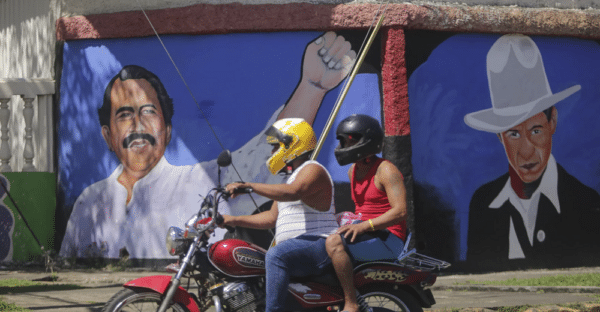NPR began its report “A Rare Look Inside Locked-Down Nicaragua” (9/10/23) with the demonstrably false claim that Nicaragua has “kept all foreign journalists out for more than a year.” This led into a harrowing story of how its reporter arrived in Nicaragua…and reported without incident.
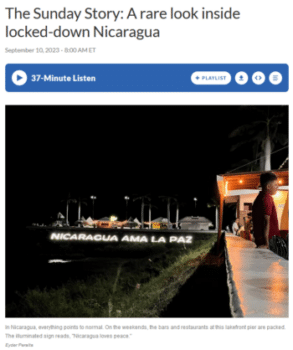
NPR (9/10/23) describes correspondent Eyder Peralta as “the first foreign journalist to make it into the country in more than a year,” which would come as a surprise to numerous independent foreign journalists.
In 2023 alone, numerous foreign journalists from press outlets from all parts of the world have reported from Nicaragua. Broadcast outlets based in the United States, China, Russia, Iran and around Latin America have regularly filed reports in both English and Spanish. Independent reporters from the United States, Canada and Britain have reported in outlets such as the Morning Star, Rabble and Black Agenda Report.
Most of the international journalists who have reported from Nicaragua in recent years have not been openly biased against Nicaragua’s Sandinista government, which perhaps disqualifies them as reporters in NPR‘s eyes. But the Associated Press, whose main correspondent for Nicaragua, Gabriela Selser, calls its government “a perverse and cruel system that exceeds all limits” (Pledge Times, 6/23/23), has published at least two stories bylined Managua this year (2/11/23, 3/12/23), though most of Selser’s Nicaragua reporting seems to be done from Mexico City. (Selser, who previously held both Nicaraguan and Argentine passports, had her Nicaraguan passport revoked by Managua.)
Steve Sweeney, former international editor of Morning Star, was prevented from reporting on the Nicaraguan presidential election in 2021—not by Managua, but by the United States and Mexico. It’s not clear that his blocked travel was connected with his attempt to cover the election—Sweeney was not given an explanation for the denial of transit—but at the least his exclusion suggests that the U.S. government has priorities higher than allowing journalists to travel freely to do their jobs.
Ayesha Rascoe, host of NPR’s Sunday Story, nevertheless said the Sandinista government of Nicaragua “has basically banned foreign journalists,” reiterating this claim on social media. Throughout the 39-minute podcast, Rascoe and correspondent Eyder Peralta didn’t name the foreign journalists who had been barred from entering, despite their emphasis on the claim.
Covid-19 entry requirements came into effect with heightened travel regulations in 2021—22, and slowed travel for all purposes to Nicaragua. A Washington Post correspondent (11/5/21) said she was unable to board her flight to Nicaragua from Mexico, after the airline informed her that she did not appear on the list provided by Nicaraguan authorities of passengers who had been approved for travel.
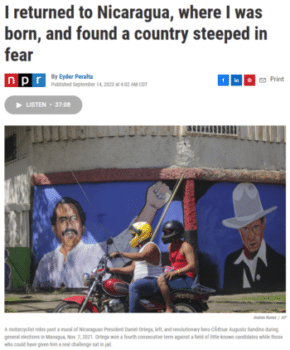
NPR (9/14/23) complains of a speech by President Daniel Ortega, “only a select group of people were invited to hear the president’s speech in person”—in apparent contrast to free countries, where all presidential addresses are always open to the public.
Similar experiences were reported by travelers who had inadequately followed the new pre-travel procedure. Nicaraguan health authorities strictly enforced the Covid-19 test requirement and even withheld approval, causing travelers to submit new tests with correct specifications and reschedule flights.
Getting in
Peralta recounted his entry through a “remote” border crossing from Honduras, where he got through the immigration checkpoint within “maybe five minutes” and entered Nicaragua: “And that was it. I was in. I was about to walk into one of the most authoritarian countries in the world, and I didn’t get asked a single question.” To his surprise, he found that “everything points to normal…. People are out shopping. They’re going to work, to school. On the Saturday that I was there, the bars were packed!”
Peralta—who at one point described at length his own family’s souring on the Sandinista movement and consequent flight from the country in the 1980s—clearly came in with preconceived notions of what he would find. Barring his own paranoia and his references to the Soviet Union, nothing about his actual experiences offered evidence of authoritarianism.
Life in what NPR (9/14/23) dubbed “a country steeped in fear” is in fact quite similar to other countries of the region that I’ve visited. Young people crammed into arenas to see popular Latino musical artists Christian Nodal, Camilo Echeverry and Olga Tañón in recent months. Bars and nightclubs are popular destinations for students and young people on weekends around the country, as are neighborhood block parties.
Nevertheless, NPR referred to the country as a “dictatorship” five times, “authoritarian” five times and, in the spirit of anti-Communism, linked it to the Soviet Union three times.
“Fear runs so deep that even the president and vice president don’t trust their countrymen enough to hold a real public rally,” Peralta reported. Peralta seemed to base this claim on the very basic security measures taken around the perimeter of a stadium on July 19 in preparation for the official act to commemorate the 44th anniversary of the triumph of the Sandinista Revolution. “Suddenly, a city that had seemed normal now has police officers on every corner,” Peralta dramatically related. He described “checkpoints” around the stadium and told listeners:
It becomes clear that only a select group of people are invited to hear the president’s speech.
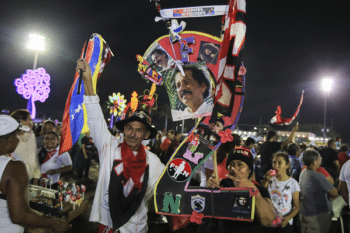
NPR (9/14/23) depicted “supporters…of Nicaraguan President Daniel Ortega” in a photograph—but did not seem to think it journalistically to speak with any of them.
His dire portrayal of an event that he did not attend—but which I did—seemed to falsely suggest that only in an authoritarian country would an event with high-level officials and foreign government representatives have guestlists and other security measures in place.
Contrary to the claim that President Daniel Ortega is unable to hold “real” public events, he presided over multiple public events in the past few weeks, including a police parade, a military parade and a Central American Independence Day parade, which were held in the center of Managua with the attendance of the public. The open events were promoted in advance by major outlets like Canal 6.
The sources
Though the segment ran 39 minutes long, it didn’t manage to interview a single supporter of the Nicaraguan government. The report relied heavily on perspectives from the exterior, despite the emphasis NPR put on Peralta’s travel to Nicaragua. Peralta interviewed three sources in the United States: an anonymous State Department official; Carolina Jiménez Sandoval of the Washington Office on Latin America (WOLA); and Félix Maradiaga, a former prisoner now released to the United States, who declared he “had always been anti-Sandinista and anti-socialist.”
Maradiaga was convicted of inciting foreign interference against Nicaragua’s sovereignty; he had appeared before a U.S. congressional subcommittee in June to seek support for overthrowing the Nicaraguan government. His wife, Berta Valle, who is also Nicaraguan, was part of self-styled Venezuelan “president” Juan Guaidó’s delegation to Joe Biden’s “Summit for Democracy” in 2021.
A FAIR report (6/4/20) called WOLA “the Western media’s go-to source for confirming the U.S. elite’s regime change groupthink.” Jiménez Sandoval is WOLA’s president, and her bio touts her record of “addressing grave crimes under international law in Venezuela and Nicaragua.”
In Nicaragua, the only sources given airtime were located in Masaya, which saw a concentration of violence during the destabilizing protests of 2018. One was a woman Peralta described as “one of the organizers” of 2018 protests there; the other was a hospital employee who, among other things, talked about the lack of supplies at the hospital, and how he is “expected to stay quiet” about them. He also said that “the economic situation is tough.” Neither he nor Peralta offer the crucial context of U.S. sanctions on Nicaragua that are precisely intended to worsen the economic situation.
Despite being in Masaya, Peralta’s report managed to omit the stories of victims whose lives were forever changed, such as Reynaldo Urbina, whom I interviewed, among many others.
No pro-government sources were featured or even mentioned in the NPR segment, aside from two short soundbites of public speeches from President Daniel Ortega and Vice President Rosario Murillo.
The piece aired two days after affluent opposition figure Gioconda Belli, who since 1990 has lived in the United States and, more recently, Spain, took to NPR’s airwaves on Latino USA. She and other opposition celebrities have been featured in spreads in Western corporate media, which has platformed several former allies of the Sandinistas’ FSLN party; the party’s more than 2 million members and leadership have not gotten similar exposure.
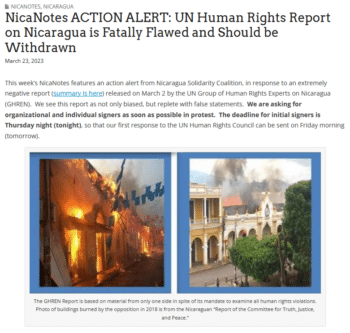
NicaNotes (3/23/23) published the open letter to the UN Human Rights Council, along with photos of buildings said to have been set on fire by the opposition.
Belli broke with the FSLN in the 1980s, around the same time that she married NPR‘s Central America correspondent. A member of WOLA’s Honorary Council, she has been interviewed numerous times on NPR since the early ’90s, and is frequently referred to as a leftist when she’s criticizing the governments of Cuba and Venezuela.
Confirmation bias
In his 15 years with NPR, Peralta was based in Africa before specializing in Latin America. At the height of the corporate media’s interest in Venezuela, as the Trump administration was tightening sanctions and threatening military intervention, Peralta sought interviews with opponents of the government rather than supporters. Following NPR’s airing of his latest report, he sat down for an interview with the Nicaraguan opposition outlet Confidencial, run by Carlos Chamorro, the son of Nicaragua’s neoliberal former President Violeta Chamorro.
Peralta had previously framed arrests and convictions as a “crackdown” on “political opponents” and dissent, without reference to the charges brought against them based on the country’s laws. The reporting downplays the armed attacks carried out in 2018, and the crimes of money laundering and treason committed by individuals who received large sums of money from the National Endowment for Democracy and USAID. These entities poured money into Nicaraguan NGOs after President Daniel Ortega was voted back into office in 2007, with the specific aim of training people to oppose his government and create the conditions for regime change (FAIR.org, 6/16/22).
The accusations of a “political crisis” and “constant turmoil” echo claims made in an update from the UN high commissioner for Human Rights that was presented before the UN Human Rights Council on September 12.
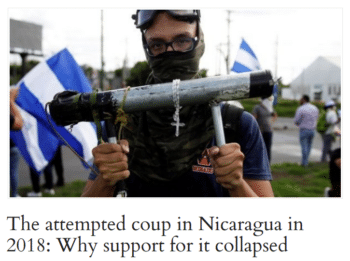
An account in MR Online (7/15/23) describes how violent opposition tactics eroded support for the opposition, as anti-government roadblocks “not only strangled the country’s transport system but became the scene of intimidation, robberies, rape, kidnappings and murder.”
Professor Alfred de Zayas, a former UN independent expert on international order, objected to a similar UN report on Nicaragua released in March, as the lead signer of a statement that called the report “fatally flawed.” De Zayas and other critics called the human rights report “biased” and an “abuse of the UN system,” saying it
completely fails to address the enormous damage done to ordinary people, businesses, and public services by violent protesters in 2018, perpetuating a gross injustice against the human rights of thousands of Nicaraguans.
What’s missing
NPR‘s report omits two important issues in understanding Nicaragua today. First, violent protests in 2018, funded by the U.S. in an effort to overthrow the government, killed a large number of innocent civilians and police. The majority of the arrests and charges that were widely reported by corporate press during and following 2018 were either directly related to acts of violence carried out during the months of terror, or to subsequent investigations that revealed the foreign financing of the anti-government riots. As is standard in U.S. establishment media, NPR showed no interest in the victims of the violent coup efforts, only in the plight of the people who were punished for allegedly instigating them.
Second, as mentioned above, coercive sanctions have been rolled out by the U.S., Canada and the EU in recent years. The latest U.S. sanctions bill currently before Congress would extend the U.S. government’s ability to impose economic punishment until 2028. Such sanctions were the subject of protest in the Havana Declaration of the G77 + China Summit, for their “devastating impacts on the realization of human rights, including the right to development and the right to food.”
At the end of Peralta’s report, back in the studio, he told host Ayesha Rascoe that the government has “closed the Jesuit University in Managua,” without mentioning that it was being reopened as a public and tuition-free institution. Classes are set to commence soon at the recently nationalized Casimiro Sotelo University, in a country whose hallmark policy since the Sandinistas returned to office in 2007 has been expansion of access to and improvement of public education at all levels.
Camila Escalante is a TV news producer and presenter at teleSUR English and also works with Kawsachun News (Bolivia).

